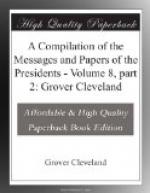Abuses having a like tendency take place in our import trade. British fabrics and products find their way into our ports under the name and from the ports of other countries, and often in British vessels disguised as neutrals by false colors and papers.
To these abuses it may be added that illegal importations are openly made with advantage to the violators of the law, produced by undervaluations or other circumstances involved in the course of the judicial proceedings against them.
It is found also that the practice of ransoming is a cover for collusive captures and a channel for intelligence advantageous to the enemy.
To remedy as much as possible these evils, I recommend:
That an effectual embargo on exports be immediately enacted.
That all articles known to be derived, either not at all or in any immaterial degree only, from the productions of any other country than Great Britain, and particularly the extensive articles made of wool and cotton materials, and ardent spirits made from the cane, be expressly and absolutely prohibited, from whatever port or place or in whatever vessels the same may be brought into the United States, and that all violations of the nonimportation act be subjected to adequate penalties.
That among the proofs of the neutral and national character of foreign vessels it be required that the masters and supercargoes and three-fourths at least of the crews be citizens or subjects of the country under whose flag the vessels sail.
That all persons concerned in collusive captures by the enemy or in ransoming vessels or their cargoes from the enemy be subjected to adequate penalties.
To shorten as much as possible the duration of the war it is indispensable that the enemy should feel all the pressure that can be given to it, and the restraints having that tendency will be borne with the greater cheerfulness by all good citizens, as the restraints will affect those most who are most ready to sacrifice the interest of their country in pursuit of their own.
JAMES MADISON.
JANUARY 6, 1814.
To the Senate and House of Representatives of the United States:
I transmit, for the information of Congress, copies of a letter from the British secretary of state for foreign affairs to the Secretary of State, with the answer of the latter.
In appreciating the accepted proposal of the Government of Great Britain for instituting negotiations for peace Congress will not fail to keep in mind that vigorous preparations for carrying on the war can in no respect impede the progress to a favorable result, whilst a relaxation of such preparations, should the wishes of the United States for a speedy restoration of the blessings of peace be disappointed, would necessarily have the most injurious consequences.
JAMES MADISON.




